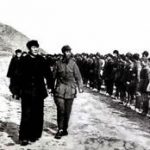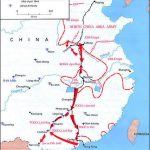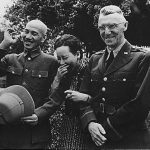History of the PRC – Part Eighteen Posted by sasha on May 7, 2011 in Uncategorized
With Mao Zedong (毛泽东) in control of the Communist Party (中共) and Chiang Kai-shek (蒋介石) leading the Kuomintang (国民党), China was still in the midst of a devastating civil war during World War II. The Second United Front had come to an end, and the separate factions were unable to cooperate with each other in fighting against Japan. With the USA now involved in the conflict, they were providing aid to and supporting Chiang and the KMT. Meanwhile, through the use of guerrilla warfare, Mao and his CCP forces were gaining support in Japanese occuppied territories.
Chiang was appointed Allied commander-in-chief in the China theater in 1942, while American general Joseph Stilwell served for a time as Chiang’s chief of staff. Their relationship was tense, however, as Stilwell wanted to take complete control of Chinese troops in order to pursue a more aggressive strategy against the Japanese. Obviously, this did not sit well with Chiang. The bad blood between the two would continue, but there were bigger problems to worry about, with the Japanese military continuing attacks on China. One such attack came with the Battle of Changde (常德会战 – cháng dé huì zhàn) in 1943, with Japan using extensive biological and chemical weapons. Shortly thereafter, in 1944, the Japanese launched Operation Ichi-Go, consisting of three separate battles. In Chinese, this is referred to as the Battle of Henan-Hunan-Guangxi (豫湘桂会战 – yù xiāng guì huì zhàn). This would be a decisive victory for the Japanese, and it resulted in upwards of 500,000 Chinese casualties (military and civilian). After this rapid deterioration of Chinese forces, Stillwell asked President Roosevelt to send an ultimatum to Chiang threatening to end all American aid unless Chiang “at once” place Stilwell “in unrestricted command of all your forces.” Naturally, Chiang refused, and he demanded that Stillwell be replaced. As a result, he was replaced by Major General Albert Wedemeyer.
After Operation Ichi-Go, the US lost confidence in China and its abilities to defend itself and help in the fight against Japan. As such, China became less of a priority for American troops, who focused more on the island-hopping offensive in the Pacific. While faith in Chiang and the KMT was dwindling, the US began to notice Mao and the Communists. In 1944, the Americans sent a special diplomatic envoy, called the Dixie Mission, to the Communist Party of China. According to Edwin Moise, in Modern China: A History 2nd Edition:
Most of the Americans were favorably impressed. The CPC seemed less corrupt, more unified, and more vigorous in its resistance to Japan than the KMT. United States fliers shot down over North China…confirmed to their superiors that the CPC was both strong and popular over a broad area. In the end, the contacts with the USA developed with the CPC led to very little.
The victory of Operation Ichi-Go for Japan would prove to have little effect on the American mission, though, and soon enough their backs would be against the wall.

Build vocabulary, practice pronunciation, and more with Transparent Language Online. Available anytime, anywhere, on any device.
About the Author: sasha
Sasha is an English teacher, writer, photographer, and videographer from the great state of Michigan. Upon graduating from Michigan State University, he moved to China and spent 5+ years living, working, studying, and traveling there. He also studied Indonesian Language & Culture in Bali for a year. He and his wife run the travel blog Grateful Gypsies, and they're currently trying the digital nomad lifestyle across Latin America.







Leave a comment: